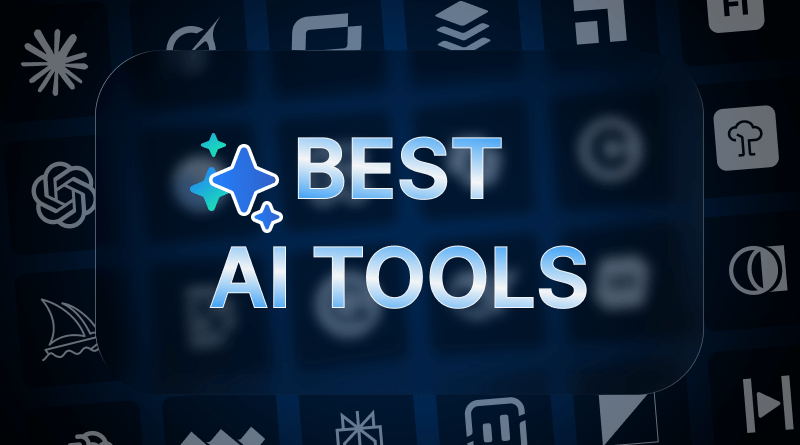Artificial Intelligence (AI) has moved from being a futuristic buzzword to becoming a daily business tool. While large corporations have been early adopters, the exciting news is that small businesses are now reaping the benefits of AI in 2025. Whether you’re running an online store, managing a small consultancy, or operating a local service business, AI tools can help reduce costs, improve efficiency, and even unlock new revenue streams.
This article will explore the best AI tools for small businesses in 2025, compare their features, discuss real-life use cases, and provide a detailed guide to choosing the right ones for your needs.
Why Small Businesses Should Use AI in 2025
Small business owners often juggle multiple roles: manager, accountant, marketer, customer service agent, and strategist. Unlike larger companies, small firms may not have the resources to hire full-time staff for every task. This is where AI steps in as a game-changer.
Key Benefits of AI for Small Businesses:
- Time-Saving Automation – Repetitive tasks like email replies, appointment scheduling, and invoice generation can be fully automated.
- Cost Reduction – Instead of hiring multiple employees, AI can perform essential tasks at a fraction of the cost.
- Improved Customer Service – AI chatbots and assistants provide 24/7 support, answering queries instantly.
- Smarter Decisions – AI analyzes data and suggests strategies to increase revenue and efficiency.
- Competitive Advantage – Small businesses can compete with bigger players by using advanced tools at affordable prices.
In short, AI allows small businesses to do more with less, making it an essential investment in 2025.
Top AI Tools for Small Businesses in 2025
Let’s explore the most effective AI tools that are making a difference for small businesses today.
1. ChatGPT for Business
- Category: AI assistant for communication, content, and automation.
- Best For: Marketing, customer service, brainstorming, and content creation.
ChatGPT is one of the most versatile AI tools available. In 2025, it has evolved into a business-focused assistant that helps companies create blogs, product descriptions, emails, ad copy, and even customer service scripts.
Use Cases:
- Writing SEO-optimized blog posts for a business website.
- Generating FAQs and auto-reply messages for customers.
- Helping with creative ideas like product names, campaign slogans, or social media captions.
Pros:
✅ Extremely versatile
✅ Easy to use
✅ Saves hours of work
✅ Affordable compared to hiring writers
Cons:
❌ May require fact-checking
❌ Works best with clear prompts
2. GrammarlyGO
- Category: Writing enhancement tool.
- Best For: Professional communication and content improvement.
GrammarlyGO goes beyond simple grammar checking. In 2025, it helps businesses maintain a professional tone across emails, reports, and proposals. It can even rewrite content in different styles—formal, casual, persuasive—depending on the need.
Use Cases:
- Polishing emails to clients.
- Drafting error-free contracts and proposals.
- Ensuring consistent brand tone in blog posts.
Pros:
✅ Enhances credibility
✅ Easy integration with browsers and apps
✅ Saves editing time
Cons:
❌ Limited creative writing capabilities
❌ Requires internet connection
3. Jasper AI
- Category: AI marketing assistant.
- Best For: Copywriting, ads, and social media marketing.
Jasper AI specializes in creating marketing-focused content. It offers templates for Facebook ads, Google ads, email campaigns, and website copy. For small businesses that need regular marketing but don’t have a dedicated team, Jasper is a lifesaver.
Use Cases:
- Writing persuasive ad copy in seconds.
- Creating social media captions that drive engagement.
- Designing customer-focused landing pages.
Pros:
✅ Tailored for marketing
✅ Saves money on hiring agencies
✅ Helps increase conversions
Cons:
❌ Requires editing for brand personality
❌ Subscription-based
4. Zoho Zia (AI-Powered CRM)
- Category: Customer Relationship Management (CRM).
- Best For: Sales teams and customer engagement.
Zoho’s Zia is an AI assistant built into the Zoho CRM platform. It helps small businesses track leads, predict customer behavior, and recommend actions to close deals faster.
Use Cases:
- Predicting which leads are most likely to convert.
- Automating follow-up emails.
- Providing data-driven insights for sales strategies.
Pros:
✅ Improves customer relationships
✅ Data-driven insights
✅ Saves time for sales teams
Cons:
❌ Learning curve for beginners
❌ Works best with full Zoho suite
5. QuickBooks AI
- Category: Accounting and finance.
- Best For: Bookkeeping, expense tracking, and financial insights.
Managing finances is a huge challenge for small businesses. QuickBooks AI automates bookkeeping, creates smart invoices, and generates financial forecasts.
Use Cases:
- Automatically categorizing expenses.
- Creating professional invoices.
- Getting financial health reports at any time.
Pros:
✅ Saves money on accounting services
✅ Provides accurate financial data
✅ Easy for beginners
Cons:
❌ Subscription costs may rise with growth
❌ Not suitable for very complex businesses
6. Hootsuite OwlyWriter AI
- Category: Social media management.
- Best For: Content creators and small brands.
Social media is crucial for visibility, but managing multiple accounts is time-consuming. Hootsuite’s OwlyWriter AI writes captions, schedules posts, and analyzes performance.
Use Cases:
- Generating daily Instagram captions.
- Planning weekly content calendars.
- Tracking engagement to improve posts.
Pros:
✅ Saves hours on social media work
✅ AI-generated captions match trends
✅ Works with multiple platforms
Cons:
❌ Requires subscription
❌ Some captions may feel generic
7. Canva AI (Magic Studio)
- Category: Graphic design.
- Best For: Branding and visual content.
Not every small business can afford a graphic designer. Canva’s AI-powered Magic Studio makes creating visuals simple. You can generate logos, posters, ads, and social media posts instantly.
Use Cases:
- Designing professional product banners.
- Generating logos in minutes.
- Creating ads for campaigns.
Pros:
✅ Extremely easy to use
✅ Huge template library
✅ Affordable
Cons:
❌ May lack advanced design control
❌ Designs can look “template-based” if overused
Comparison Table of Best AI Tools for Small Businesses (2025)
| AI Tool | Main Purpose | Best For | Key Strength | Pricing (2025) |
|---|---|---|---|---|
| ChatGPT for Business | Content creation, support | Marketing, customer engagement | Versatile automation | $20–$50/month |
| GrammarlyGO | Writing assistant | Emails, blogs, reports | Professional communication | $12/month |
| Jasper AI | Marketing & ad copy | Ads, social media, campaigns | Tailored for marketers | $39–$99/month |
| Zoho Zia | CRM & sales automation | Customer relationship management | Predictive sales insights | From $14/user/mo |
| QuickBooks AI | Accounting & bookkeeping | Finance management | Smart financial tracking | $30–$200/month |
| Hootsuite OwlyWriter | Social media management | Content creators, small brands | Saves time on social media posts | From $99/month |
| Canva AI | Graphic design | Branding, visuals, ads | Easy design for non-designers | Free–$14/month |
How to Choose the Right AI Tool for Your Business
Choosing the right AI tool depends on your business goals:
- If you want to create content → ChatGPT, Jasper, GrammarlyGO.
- If you need customer management → Zoho Zia.
- If you struggle with finance → QuickBooks AI.
- If your focus is marketing & branding → Canva AI, Hootsuite.
Tip: Start with one or two tools, measure results, and scale gradually.
Real-Life Example
- A small online clothing store uses Canva AI for banners, ChatGPT for product descriptions, and QuickBooks AI for finance.
- As a result, the owner saves 20+ hours per week and increases sales by 35% because of better marketing and professional branding.
Pros and Cons of Using AI in Small Businesses
Pros:
✅ Saves time and money
✅ Improves productivity
✅ Enhances professionalism
✅ Helps compete with big brands
Cons:
❌ Requires learning and adaptation
❌ Some tools can be costly
❌ Not 100% accurate—human oversight still needed
Final Thoughts
In 2025, AI is no longer optional—it’s essential for small businesses that want to grow and stay competitive. From handling accounts to boosting sales, AI can transform every area of a small business.
The best part? These tools are affordable and easy to use, making them accessible for startups and entrepreneurs worldwide.
👉 If you’re a small business owner, start experimenting with one or two AI tools today. You’ll quickly realize how much time and money you can save—while delivering better results for your customers.

